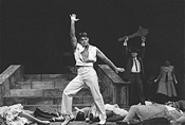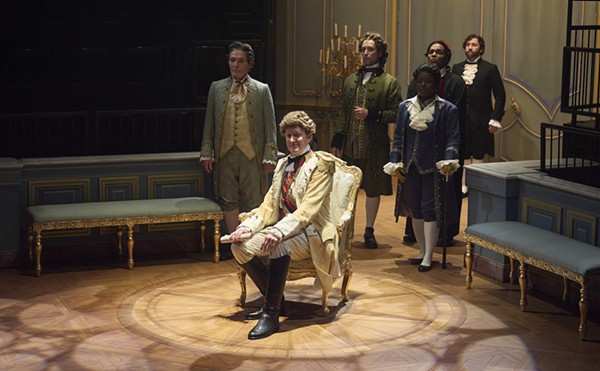Jim Jacobs and Warren Casey's Grease is a knowing look back, a testament to the self-proclaimed outsiders who cut study hall, smoked in the johns, and found fulfillment through attitude and rebellion.
Bye Bye Birdie, making its monthly Cleveland appearance, this time at Cain Park, is set in the time it was written (1960), ostensibly a parody of the havoc caused by the drafting of Elvis Presley. Yet this is a pretext, a gimmick for the press agent. Actually, it is a valentine to the conformists, a cartoon of small-town America, the wholesome havens rhapsodized over weekly in yellowing back issues of Life magazine. It's an anthem to nice kids—the boys in letter sweaters, harmless puppies whose greatest erotic fantasy was giving their pins to their sweethearts. The girls also played by the rules, gossiping on their princess phones, looking for that "one special boy." They couldn't conceive of anything more decadent than a chaste smooch in the icehouse. Here, genuine sex, even with their Elvis-like teen idol, is unthinkable. The dads are none-too-bright, Kiwanis cut-ups, and the moms still live in Donna Reed land. The show doesn't take these kids all too seriously. Instead, it focuses on the hot and cold amours of a mama's boy songwriter-manqué and his suburban spitfire of a secretary.
Charles Strouse and Lee Adams's score is an impeccable blend of early rock-and-roll pastiche and vaudeville flash.
This musical was distorted and immortalized by its wildly successful film version. Even though it fixed Michael Stuart's ramshackle book, it sacrificed the original touching, sweet innocence to Disney-like special effects. It glamorized its All-American, fifteen-year-old, Girl Scout cookie heroine, Kim, giving her a magic puberty that transformed her into Ann-Margret's Olympian love goddess next door.
Those who witnessed last May's Pittsburgh Opera production at Playhouse Square may have been pleased by its show business razzamatazz, including singing, dancing, and orchestra, but were inevitably dispirited by its cynical overkill. It emphasized the show's potholes with its plaster-of-paris performances. It was like spending two acts listening to the pitch of a carny barker.
Even if you suffer from acute Birdie-itis, you should consider one last fling at Cain Park, for here is a major asset: an interpretation that rejuvenates the work's lost innocence, uncovering the sweetness that lies buried in the silliness.
Though it's a surprise when the orchestra plays a note that hasn't been flattened, when the dancing rises above your basic freshman recital or the papier-mâché Brady Bunch-inspired sets don't collapse, the audience leaves the theater in a cloud of reveries over their lost youth.
Director Terri Kent's interpretation has something not found on budget rosters—a gentle charm, a joie de vivre worth its weight in heartfelt pleasure. She manages to humanize this most cartoony of musicals.
Even when these jolly players create a terpsichorean sin or put a musical note through the wringer, they are unfailingly and endearingly right. Michael McIntosh manages to infuse Dick Van Dyke's old role with a Montgomery Cliff-like fragility. As his Spanish tootsie, Sandra Emerick almost sets the Cain Park foliage on fire with her cheeky interpretation of that great specialty number, "Spanish Rose."
Lissy Gulick, as the great Freudian nightmare of a mother in mink stole and cat's-eye glasses, suggests something from the Far Side. As teen heroine Kim MacAfee, Kelly Murphy takes the opposite path from Ann-Margret and goes the route of a Keebler cookie elf. She is the most irresistible rascalette since Pippi Longstocking. As MacAfee's parents, Rohn Thomas and Jennifer Cochran burst the seams of their period costumes with beefy bonhomie.
Conrad Birdie may be the most underwritten title role in the history of musical theater, yet Daniel C. D'Amico, with his smooth-lipped sensuality, death-defying splits and somersaults, and smoldering beefcake vacuity, is the most sizzling Conrad Birdie to come along since the great Pelvis himself.
With this freshly scrubbed Birdie, we at last get a glimmer of why it has become one of America's most over-produced teenage passion plays.













